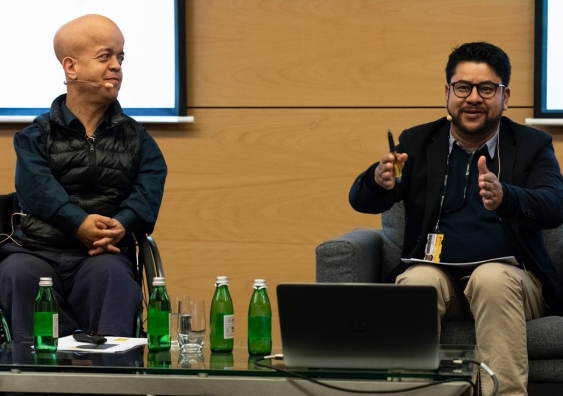Robotics and the disability care sector: opportunity or threat?
Experts spoke to an eager audience at UNSW Sydney on Thursday about the opportunities and threats of robotics in the disability and care sector.
Experts spoke to an eager audience at UNSW Sydney on Thursday about the opportunities and threats of robotics in the disability and care sector.

Julia Nichols
UNSW External Communications
9385 0606
j.nichols@unsw.edu.au
The latest Grand Challenges event delivered in partnership with UNSW Sydney’s Disability Innovation Institute posed an important question – will robots help or threaten disability care?
UNSW’s Dr Eduardo Benitez Sandoval, Scientia Professor in the faculty of Art and Design, told a packed audience about his passion for social robotics and the socially interactive robots helping people with disability, including Paro the fluffy white seal built to help people with dementia to communicate and Jaspar the doll-like social robot that teaches children with Autism Spectrum Disorder to feel more comfortable with social interaction.
He said there is enormous opportunity for robotics to empower people with disability but much work is needed to make these technologies accessible to all.
British Professor of Disability Research at the University of East Anglia, Tom Shakespeare, was also hopeful of the opportunities social robotics presents but said ethical research must accompany technological advancement.
“Relationships between care workers and people with disability are so important. I think relying on robots could change the way we value this care. We need more research on the social and cultural framing within which social robotics are developed,” Shakespeare said.
Rosemary Kayess, the Interim-Director of UNSW’s Disability Innovation Institute said this interdisciplinary approach to research is exactly what the Institute has set out to do.
“It is exciting to see today’s discussion reinforce what the Disability Innovation Institute is doing. We are developing research that is informed by the entire community and bringing people with disability into the design stages,” Kayess said.
UNSW’s Grand Challenges program was established to facilitate critical discussion on the biggest issues facing humanity. This event is part of the Grand Challenge on Living with 21st Century Technology.